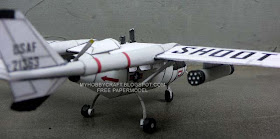Design and development
As with the civilian version, the Skymaster was a low cost twin-engine piston powered aircraft, with one engine in the nose of the aircraft and a second engine in the rear of the fuselage. The push-pull configuration meant a simpler single-engine operating procedure due to centerline thrust compared to the common low-wing mounting of most twin engine light planes, and also allowed for a high wing, providing clear observation below and behind the aircraft. During the Vietnam War, the Skymaster was intended to be replaced in the forward air control (FAC) mission by the OV-10 Bronco, but the O-2A maintained a night mission role after the OV-10's introduction due to the OV-10's high level of cockpit illumination, rendering night reconnaissance impractical.[1] The O-2 was phased out completely after additional OV-10 night upgrades.[2][3]
The first O-2 flew in January 1967 and the plane went into production shortly thereafter, with the USAF taking delivery in March 1967. A total of 532 O-2s were built in two variants for the USAF by 1970. The O-2A served as a FAC aircraft with the 20th Tactical Air Support Squadron, while the O-2B was equipped with loudspeakers and a leaflet dispenser for use in the psychological operations (PSYOPS) role. Several USAF O-2 aircraft were later transferred to and operated by the former VNAF South Vietnamese Air Force.[3]
Following the Vietnam War, the O-2 continued to operate with both U.S. Air Force and Air National Guard units well into the late 1980s. Six former USAF O-2A airframes were also transferred to the U.S. Navy in 1983 for use as "range controllers" with Attack Squadron 122A-7 Corsair II at Naval Air Station Lemoore, California. These same aircraft were later transferred to Strike Fighter Squadron 125VFA-125), the F/A-18 Hornet FRS at NAS Lemoore, in 1986 for use in the same range control role.[4] (VA-122), the Pacific Fleet Replacement Squadron for the (
The six Navy O-2A's remained in this role until September 1990, when they were replaced by T-34C Turbo Mentor aircraft transferred from the Naval Air Training Command. Four of the Navy O-2A aircraft were retired and two of these became civil registered in October 1991. These two aircraft were flown in U.S. airshows performing a "Viet Nam Warbird COIN/FAC" routine during the 1990s. The routine debuted at the "Wings Over Houston" (Texas) airshow in October 1991.[citation needed]
Of the six USN aircraft mentioned above, two were transferred to the U.S. Army in late 1990.[4] O-2As had originally entered the U.S. Army's inventory in 1967 from USAF stocks and were augmented by the 1990 aircraft transfer from the U.S. Navy. Several disassembled USAF O-2s remain in storage at Davis-Monthan AFB, Arizona.[4] Two O-2As were used at Laguna Army Airfield, Arizona as part of testing programs carried out by the Yuma Proving Ground. These were retired in October 2010 and sent to a museum. source


 testbuilt
testbuiltbody assembly
landing gear assembly

rocket tube, props, landing gear and tail
give lead (ex/nail) inside the fuselage to maintain the balance
buy now here
please give some note the model name in paypal transaction and choose "send as give/friends" option
for Indonesian you can have it here
























Keren lah Bray.....
ReplyDeleteKlo yg ada dsini, bisa jadi papercraft ga om.. Keren2 sih..
ReplyDeletehttp://forum.outerspace.terra.com.br/showthread.php?t=319301
@roiii
ReplyDeleteelah kw super
bisa aja bro, malah sebagian gw pernah liat udah ada yg bikin , beberapa juga udah masuk target operasi gw....hehehe
Will this beauty be released soon?
ReplyDeletehello where I can download the plans to build this paper model
ReplyDeleteNah, you should buy it
DeleteI still tryin to working out this model, please be patience.
ReplyDeletethanks
Thank you!
ReplyDelete